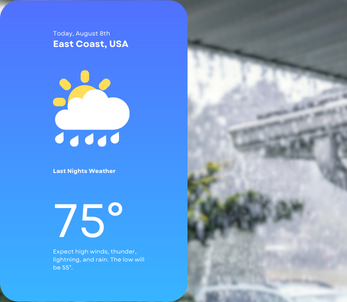Hurricane Preparation: 7 Important Steps to Follow
The National Weather Service has designated May 9-15 as National Hurricane Preparedness Week. And when it comes to natural disasters, nothing causes damage and destruction like a hurricane.
Each year, tropical storms and hurricanes cause an estimated $54 billion worth of economic losses in the United States (according to the Congressional Budget Office). And more than half of that damage is related to repairing homes.
It is important to know if you live in the path of a hurricane because as scary as it sounds, it’s nearly inevitable that you’ll experience some type of damage to your home or property. This is where working with your local agent and picking the correct policy and endorsements comes into play.
With some basic preparation and a couple steps, you can help reduce the impact of the storm on your home and keep your family safe.
WHEN IS HURRICANE SEASON?
In the United States, the official Atlantic hurricane season starts from June 1 to Nov. 30. While storms are most likely to occur during this period, hurricanes can happen any time the weather conditions are right.
If you live in a hurricane-prone area, preparation can be key to minimizing storm damage.
Wondering what to do before a hurricane? Follow this hurricane prep list for tips to help weather the storm:
TIPS FOR BEFORE THE START OF HURRICANE SEASON
- Make an emergency plan. Having a plan that your whole family knows and understands will help ensure quick action and knowledge if a hurricane strikes. A plan can help you make decisions faster and reduce fear in young children.
- Know your evacuation route. If a hurricane is headed your way, you may be asked to evacuate your home. Map out the route ahead of time and know what the final destination is in advance. This can help you evacuate quickly when time is of the essence.
- Sign up for trusted alerts and warnings. During a hurricane, you’ll need access to timely, reliable information. So it’s best to identify several methods to receive alerts or warnings before a hurricane. Download the Federal Emergency Management Agency (FEMA) app on your phone to receive real-time alerts from the National Weather Service. It’s also wise to familiarize yourself with how the Emergency Alert System (EAS) and Wireless Emergency Alert (WEA) work in your area.
- Find a trusted radio news station and have access to a battery-operated radio. If utilities go down, a radio may be your only reliable source of information. Purchase a battery-operated or hand-crank radio to have on standby. And have written down the important radio stations nearby.
- Locate important documents. Have all your important documents like your medical information, insurance policies, passports, birth certificates and proof of address in a waterproof and fireproof container. Also make copies and include those in your evacuation kit so they will be ready to go in case of an emergency.
- Double-check your insurance policy. In the world of insurance, hurricane watch is called about 48 hours ahead of tropical storm-force winds. This means that during that time, you will not be able to make any changes to your policy or get a new policy. That is why it is so important to know ahead of time what your policy covers and to work with your local agent to ensure that your home and property are correctly covered BEFORE hurricane season starts.
- Create a home inventory. You should already have a home inventory and keep it updated for your insurance policy, but this is especially important in case you to file an insurance claim caused by a hurricane. Curious about starting a home inventory? It is easy – just start by making a list of all your personal possessions, along with their estimated value.






